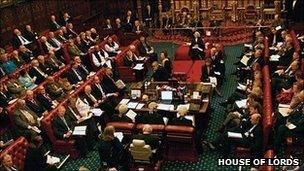Welfare bill suffers Lords defeat over child support
- Published
- comments

The Welfare Reform Bill has already run into trouble in the Lords
The coalition has suffered its biggest defeat in the Lords since being elected over plans to charge single parents to use the Child Support Agency.
An amendment by Conservative peer Lord Mackay was backed by 270 votes to 128 - the largest in a series of defeats for the Welfare Reform Bill.
He argued it was unfair to charge lone parents who had tried and failed to get their ex-partners to pay maintenance.
The government said it would seek to overturn the defeat.
On Monday, the government was defeated in the Lords in a vote on its plans for a £26,000-a-year household benefit cap.
That amendment, put forward by the Bishop of Ripon and Leeds, was backed by Labour, Lib Dem and crossbench peers, but the government has insisted it will press ahead with the plan.
Wednesday's defeat over child support was by a majority of 142 - the previous largest defeat was a loss by 112 votes on plans to abolish the chief coroner.
The BBC's political correspondent Ben Geoghegan said the latest defeat was particularly significant, not just because of its scale but because the rebellion was led by a former Conservative minister and supported by so many party grandees.
The list of Tory rebels included former ministers Lord Lawson and Lord Carrington - who, like Lord Mackay, both served under Margaret Thatcher.
Cross-party support
The current system costs the taxpayer £460m a year and ministers say it leaves 1.5 million children without effective financial support.
They want to encourage parents to come to their own arrangements rather than relying on the state to set child maintenance payments.
They are seeking to introduce an up front charge of £100 or £50 plus a levy of up to 12% on maintenance payments if a single parent had taken "reasonable" steps to get the other parent to come to a voluntary agreement on child support.
The government says the poorest parents will only have to pay £20 up front and charges will not apply in cases where there has been domestic violence.
But Lord Mackay said: "I am entirely in favour of that but if that proves impossible where the woman is at the stage where there is nothing more she can do, the only thing she can do is pay.
"And what does that do? If anything that might make her not go to the Child Support Agency at all and the child may lose their maintenance."
Labour peer Lord Morris said he was "aghast" at the plan, asking: "What is the purpose of imposing on the most vulnerable people a charge of this kind?"
Tory peer Lord Newton of Braintree said he had "no problem with the case for reform", but the proposals were "not just".
Cross-bencher Baroness Butler-Sloss, a former family barrister and judge, said there were fathers "who would simply not pay".
She told peers: "The idea that a mother in very poor circumstances, where the father has left her with young children, who finds herself having to seek social benefit from the state which she may not have sought before ... she then has to pay a fee for the welfare of her children, where she may not have any money and he may have some, it is profoundly unfair."
'Financial incentive'
Speaking on behalf of the government, minister Lord De Mauley said Lord Mackay's amendment would require the state "to try to arbitrate" on whether a parent had taken reasonable steps.
He said parents could challenge the decision, adding to the "cost and complexity" of the system, and even if they were allowed to offer a "self-declaration" that they had taken all reasonable steps, the scheme would cost £200 million to the end of March 2019.
He said there must be a "clear financial incentive" to encourage parents to reach their own maintenance settlements, adding: "We no longer require parents to use the CSA. We do not want it to be the default option.
"We don't want to return to the days when the state is encouraging parents to blame each other."
A spokesman for the Department for Work and Pensions said: "We are disappointed that the Lords seem content to leave in place a system that has consistently failed children and we will seek to overturn this in the House of Commons.
"Our reforms would see a doubling of support for families going through a break-up to come to their own financial arrangements with a far improved statutory scheme in place for those that really need it.
"It is right and fair that there is a charge for using a service that can cost the taxpayer around £25,000 per case and almost half a billion pounds per year."
- Published13 January 2011
- Published23 January 2012
- Published22 January 2012
- Published20 January 2012
- Published2 February 2012
- Published20 November 2011
- Published17 January 2012